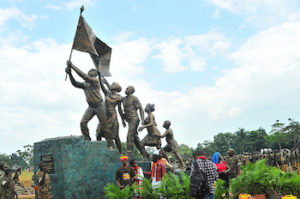
Ugandan Flag
On this date in 1962, Uganda achieved its independence from Great Britain. After much experimenting, a federal constitution was promulgated in April of that year. This repaired the invasion of the 1884 Berlin Conference, the high point of white European competition for territory in Africa, a process commonly known as the Scramble for Africa.
The Uganda People's Congress won the elections, and Milton Obote became prime minister. Independence was granted that October. Dissension continued, however, and in May 1966, Obote sent the army into Buganda and drove the kabaka into exile. He then proclaimed a new republican constitution, formally abolishing the kingships, and became Uganda's first president of a unitary government. Bugandan's disobedience, a falloff in the economy, and corruption charges led to an army coup in January 1971. Power was in the hands of army commander Idi Amin, who began eight years of misrule.
By 1978, Uganda was bankrupt, and the government depended on massive loans from Arab states that were friendly to Amin. Uganda went to war with neighboring Tanzania in late 1978, and Tanzanian forces, allied with Ugandan rebels, drove Amin from the country early the following year. In 1982, after Tanzanian troops had been withdrawn, anti-government guerrillas became active, and thousands of young men were arrested and suspected of being guerrillas. After that, more than 100,000 Ugandans were killed or starved to death. The early 1990s saw an upsurge in terrorism in northern Uganda, the home of Museveni's political enemies. In the mid-1990s, hundreds of Ugandan soldiers and civilians were killed in attacks by the Lord's Resistance Army, a Christian fundamentalist rebel faction led by a former faith healer.
A new constitution was adopted in 1995 that established a democratic, though nonparty, system of government. Despite unrest and dissent in the north, presidential and legislative elections proceeded as planned in 1996. Yoweri Museveni won 74 percent of the vote in Uganda's first presidential elections in 16 years. Opposition candidates, forced to run unaffiliated with a political party and limited to one month of campaigning, claimed the vote was unfair. Still, the elections were widely endorsed by international observers.
In the nonparty "Movement" system instituted by Museveni, political parties existed but could not campaign in elections or field candidates directly. A constitutional referendum canceled this 19-year ban on multiparty politics in July 2005.
Museveni ran against several candidates in the February 2006 presidential elections. The most prominent of his competitors was exiled Dr. Kizza Besigye. Museveni was declared the winner.